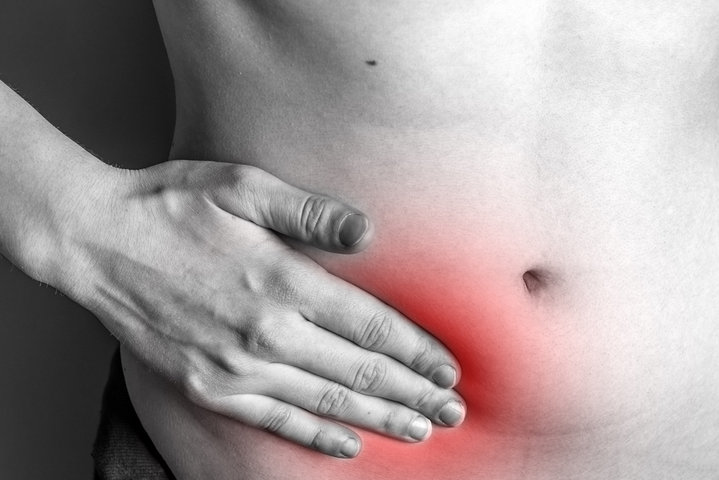+62 817-4929-054
HERNIA: Causes, Symptoms And Treatment
by: dr. Gisela Karina Setiawan, Sp.B, FINACS

A hernia is a medical condition in which an organ or tissue in the body protrudes through a defect or weak point in the surrounding muscle or tissue wall. Usually, hernias occur in the stomach area, but they can also appear in other areas such as the upper thighs, navel, or even in surgical scar areas. This condition can cause a variety of disturbing and potentially serious symptoms if not treated immediately.
Types of Hernias Based on Location:
Hernia Inguinal: This is the most common type of hernia (75%), occurring when the intestines or other tissue protrudes through the muscle wall in the groin area. Inguinal hernias are classified as hernias direct or indirect. Can be congenital or acquired. This type is more common in men.
Femoral Hernia: This type of hernia occurs when tissue protrudes through the femoral canal, which is located near the upper thigh. Femoral hernias are more common in women, especially those who are older.
Umbilical Hernia: Occurs when a portion of the intestine protrudes through the abdominal wall near the navel. This type is common in newborn babies, but can also occur in adults.
Incisional Hernia: This hernia occurs in the surgical scar area on the stomach. Usually occurs due to weakness of the abdominal wall around the surgical area.
Nature of Hernia:
Hernia Reducible, where the contents of the hernia sac can still be reinserted.
Hernia Irreducible, where the contents of the hernia sac cannot be reinserted.
Hernia incarcerates, where the contents of the hernia sac are pinched by the hernia ring so that it cannot be returned and passage disorders and signs of intestinal obstruction occur.
Hernia strangulated where there is disruption of vascularization to the point where intestinal necrosis and death occur.
Causes of Hernia
Hernias occur due to a combination of muscle weakness and excessive pressure on the body. Risk factors for hernias include:
Male gender (27% occur in men and 3% occur in women)
Family history of hernia (8x increased risk of hernia)
Muscle Weakness: can occur due to aging, injury, or congenital defects.
Excessive pressure on the stomach: Activities that increase pressure in the stomach such as lifting heavy weights, chronic coughing, constipation or a history of prostate disease can increase the risk of hernia.
Other Risk Factors: Obesity, pregnancy, and a history of smoking can also increase a person's risk of developing a hernia.
Symptoms of Hernia
Hernia symptoms can vary depending on the type and location of the hernia. Some common symptoms that often occur include:
Lumps that appear to disappear. The lump enlarges when standing or coughing and usually disappears when sleeping on your back.
Pain or discomfort: pain can occur especially when lifting weights, coughing, or when defecating.
Signs of intestinal obstruction can occur in incarcerated or strangulated hernias due to entrapment of the hernial ring (abdominal pain, nausea, vomiting, constipation)
Hernia Treatment
Surgery is still an effective treatment for patients with symptoms/ symptoms. For patients who are asymptomatic or with minimal symptoms, monitoring/observation (watchful waiting) can be a safe and reasonable step. In general, some treatment approaches include:
Observation: In small hernias that do not cause symptoms, the doctor may recommend observation without surgery. However, hernias need to be monitored regularly to ensure they do not enlarge or cause complications.
Use of supports: In some cases, the use of supports such as hernia belts can help reduce symptoms.
Surgery: Surgery is the most common and effective treatment for hernias. There are two types of hernia surgery, namely open surgery and laparoscopy. Both methods aim to return protruding organs or tissues to their original position and strengthen weak muscle walls.
Hernia Prevention
Although not all hernias can be prevented, there are several steps you can take to reduce the risk of developing a hernia:
Maintain an ideal weight: being overweight can increase pressure on the abdominal wall, which can cause a hernia.
Avoid lifting heavy weights: If you have to lift heavy weights, make sure to do it with the correct technique.
Strengthen abdominal muscles: exercises that strengthen abdominal muscles can help prevent hernias, especially in people at high risk.
Eat healthy foods: a diet rich in fiber can prevent constipation, which can reduce pressure on the stomach.
Conclusion
A hernia is a condition that requires medical attention because it can cause serious complications if not treated properly. If left untreated, it can cause serious complications such as incarcerated hernia or strangulation. Surgery is still an effective treatment for hernias. Therefore, it is important to understand the symptoms of a hernia and seek immediate treatment if necessary.
for information & to make an appointment Doctor can contact:
Contact Centre: 1 500 908
WhatsApp Chatbot Appointment: +62 8122 2309 911
| Loading data... |
|---|















